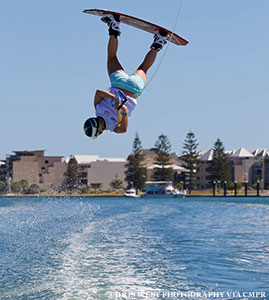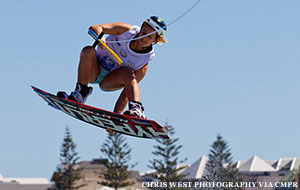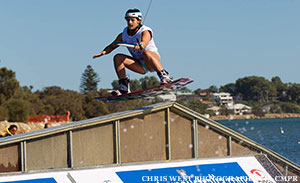When you grow up on the water, and when you grow up the daughter of a world champion -- both of which Raimi Merritt did -- life is likely to take you in one of two directions.

There was never any pressure, both Raimi Merritt and her father, former world champion barefoot water skier Steve Merritt, readily admit for the daughter to follow in the father's wake.
Oh sure, the easy way was an option: To choose to chase other pursuits, making a name somewhere else other than an aquatic arena where there were no family ties.
But the thought of living life to the extreme always appealed to Raimi Merritt, who first strapped a wakeboard to her feet at age 9 and who, within five years, was counted among the sport's professional ranks.
The world championship titles her father had won had always intrigued Raimi Merritt and chasing after titles of her own provided motivation rather than the stress those following after their parents may have endured.
But even in the beginning, Merritt always figured that if she was going to do this, if she was going aspire to be great at what she did, there was no sense boxing herself in with limits.
She was in -- all the way.
Merritt's father had spent years before he reached world champion status. So in her own right, in a sport Merritt could call her own, why couldn't she do the same thing?
Now at 19, Raimi Merritt has had world champion affixed to her name six times over.
At 19, she is mentioned in the same breath as some of professional wakeboarding's female legends -- the Dallas Fridays, the Amber Wings and the Nicola Butlers of the world -- and has no plans to stop climbing to the top of a sport that is just reaching the apex of its popularity.
Yes, at 19, Raimi Merritt can't imagine living life any other way.

"It's cool to be at that level," Merritt says in a phone interview this week while preparing for this weekend's World Wakeboard Association Rockstar World Championships in Pleasant Prairie, Wis. "You dream about it and it's not that you think it's not going to happen, but once you achieve it for the first time, it's like, ‘Oh my gosh, this is so real, this is so cool.'"
Turns out, Merritt was just getting started.
But while she has quickly become one of professional wakeboarding's biggest stars, the level she has risen to comes as no surprise to those who know her best.
Her success has come with sacrifice and long hours on the water. And in a sport that requires a certain level of risk en route to the reward, Merritt has embraced every challenge, loving every step of the journey.
"When she started training, she really wanted to change the sport and wanted to take it to another level," Steve Merritt says. "And she has definitely taken the level of riding up to a whole other notch."
Merritt grew up around water skiing and had always gravitated to the way skiers were able to contort their bodies off a jump.
She was pulled to the water by her father, who had risen in the ranks of professional water barefoot skiing during his own career. While he wouldn't push her in any direction, Steve Merritt wanted his daughter to love the water the way he did.

When Raimi was born, wakeboarding was still in its infancy. But the way Steve Merritt figured, if this was something she could grow to love, his influence and his guidance certainly couldn't hurt.
Raimi started on skis, but quickly realized she wanted more, drawn in by the wakeboarding's daredevil appeal. Her parents knew there would be times when their daughter would fall -- and fall hard -- but like Raimi, they knew success involved some risk-taking.
"There's definitely a lot more fear to it," Merritt says. "But that's the cool part of it."
She started simple, mastering the basics. But adding her own twists and pulling off tricks that other female wakeboarders hadn't only made the sport that much more alluring.
There would be some fear to overcome anytime she added to her personal repertoire. Surely, there would be bumps, bruises and even a few broken bones along the way, but that certainly wouldn't stand in Merritt's way.
"I didn't see that as a negative," she says.

Even at a young age, wakeboarding seemed to be a natural fit. Merritt had grown up on the water and dabbled in gymnastics as a child. So balance wasn't an issue nor was flipping her body in the air, a skill she had picked up on a trampoline.
So when it came to taking it all to the water -- all while being pulled behind a boat -- finding a comfort zone within a sport that was just taking off was never a problem.
She surrounded herself by top-notch coaches and athletes who could bring her along, putting her in position to take what she learned and make it her own.
At first, some of the tricks seemed unrealistic, forcing Merritt to overcome temporary bouts with fear before she'd throw them into the mix of what was possible.
The more she improved, the more she threw in tricks with higher degrees of difficulty. She'd see the kind of things her wakeboarding heroes were pulling off and she'd push herself to learn them -- and more.
She became the first female wakeboarder to pull of an S Bend behind a boat. The trick, also known as a Superman, is a Raley in which her body became inverted before going into a 360-degree turn before landing perfectly on the water.
The trick, which had been done by men in the sport's professional ranks, made Merritt a known commodity just as she was really getting started.
While the tricks were becoming more advanced, Merritt still rode with a natural ease. Maybe it was because she was spending nearly every day on the water. Her parents chose to homeschool their children, giving them more freedom to explore their passions.

The family traveled the world together, opening doors to Merritt, who only attended kindergarten in a traditional school, that only benefitted her as she began to rise in the sport. Rather than exploring the world on a globe or a map, Merritt saw it for herself, gaining a well-rounded life education that also allowed her time to focus on the sport she loved so much.
For Merritt, that meant spending long hours on the water, constantly working to close the gap between her and her competition.
"There were some tough bumps along the way and I never really expected it to be easy," Merritt says. "But I go out there and when you work that hard and that much, it should become easier."
The harder Merritt worked, the more she gained respect from her peers, both female and male alike. In her first professional competition in Singapore, Merritt finished second, ahead of many of the competitors she had grown up in awe of.
That only pushed her more.
"I'm sure in her mind, it was tough to go against gals like a Dallas Friday who have been some of the best in the industry -- X Game winner, ESPY winner -- one of the best there is," Steve Merritt says. "But once she had beaten her a couple of times, I think that gave her the confidence that she could beat the other (top wakeboarders) that are out there."

Even early in her professional career, Merritt was pulling off tricks that others simply weren't doing, giving her credibility as someone who was serious about taking the sport by storm.
"She is in full stride to take the top spot and the other girls know it," Merritt's coach, Mike Ferraro said in a 2009 interview. "She's coming up with tricks that no other girl has ever tried."
But Merritt realized that if she was going to become one of the faces of her sport, it wouldn't come easily. The S Bend that made her famous was simply the beginning. She continued to add more tricks to her performances, which seemingly brought more success and World Cup titles.
Before long, the sport knew who Raimi Merritt was.
"You've got to earn your respect," says Merritt, who has broken her ankle, dislocated her ankle and torn a bicep during her career. "If you're going to go out there and do those tricks, you're going to take the hard falls and keep going and not let the fear get to you.

"That's how people respect you and look up to you -- it's because you're not afraid and even if you are, you're going to overcome that."
Merritt captured her first world championship in 2008 in Egypt, only a year after she turned pro. Since then, she's added World Cup titles in Qatar, China, South Korea, Malaysia and earlier this year at the International Waterski and Wakeboard Federation World Cup in Australia.
Once driven just to become a world champion like her father had years before in his own sport, Merritt, who was IWWF's Female Pro Rider Of The Year in 2011, is now motivated by continuing to add to her championship resume.
As much as Merritt focuses on the present, there's another title she's eyeing. This year, cable wakeboarding was added to a short list of eight sports being considered for the 2020 Summer Olympics following the surge of excitement created by the addition of snowboarding in the 2010 Winter Games in Vancouver.
The International Olympic Committee will add one event to the summer games in a vote that will take place in 2013, giving Merritt and her fellow competitors hope that their sport could be taken to even a higher level in the near future.

Merritt watched the recently completed London Games with great interest, adding to the intrigue that one day, she could become a participant.
"Just watching the Olympics gives you this motivation just to leave life to the fullest and to do whatever you're doing -- but better," Merritt says. "It's crazy to think that could be me in 2020, but it's awesome."
For now, Merritt will continue to be one of professional wakeboarding's ambassadors, helping promote a sport that is barely older than she is. As she's grown up on the inside of an extreme sport that will gain even more popularity with the release of an MTV production, "Wake Brothers" that follows the lives of professionals Phil and Bob Soven, Merritt can't help but get excited as wakeboarding continues to gain traction among mainstream athletics.
And as it does, Merritt plans to remain a household name, constantly driven to keep pushing her to limits she only dreamed about only a decade ago.
But now at the top of her sport rather than being the one just starting to explore it, Merritt won't stop chasing her goals now.
"When I go into a tournament, I'm not worrying about what everyone else is doing because I can only do what I can do," Merritt says. "I'm just focusing doing the best I can do and then everyone else is going to have to follow that."
-- Email Jeff Arnold at jeff.arnold@thepostgame.com and follow him on Twitter @jeff_arnold24.

.








